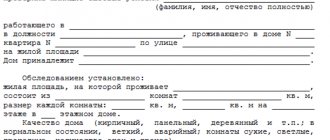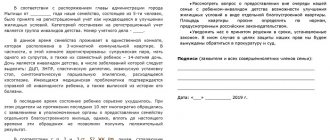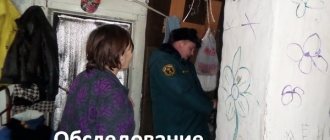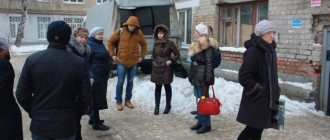admin 12/08/2016 0 Comments
Permanent
intentional deterioration, recognition as needy
The deliberate deterioration of housing conditions is one of the main obstacles to military personnel exercising their housing rights.
What do we mean by deliberate deterioration of living conditions?
As we said above, about the deliberate deterioration of living conditions
they began to talk only after the introduction of the new Housing Code of the Russian Federation; in fact, it was then that the very concept
of deliberate deterioration of housing conditions
. This concept appears in Art. 53 of the Housing Code of the Russian Federation, while neither the code itself nor other laws and regulations disclose this concept. Moreover, it is not even clear who and how can qualify a citizen’s actions as .
Here the definition of the Constitutional Court and the work of legal experts come to the rescue, on the basis of which it is possible to identify the main signs that make it possible to distinguish the deliberate deterioration of living conditions
from innocent actions of citizens.
And the main feature here is the intentionality of the actions - that is, the citizen at the time of their commission must be aware that these actions entail a deterioration in living conditions
and agree to the occurrence of such consequences. Besides:
- As a result of actions of this kind, a citizen may be recognized as in need of improved housing and registered.
- A citizen must have the intention to register as someone in need of improved housing conditions. Without this, it is impossible to qualify his actions as an abuse of subjective right.
- At the time of the commission of the act, the citizen should not be registered as in need of improved housing conditions. This sign is also very important, because if actions that lead to the deterioration of living conditions
are committed by a citizen who is already in line for housing, they are automatically deprived of the sign of intentionality of actions.
It turns out that the deliberate deterioration of living conditions
can be considered any deliberate actions, as a result of which a citizen acquires grounds for recognizing him as in need of improved housing conditions and receiving housing from the state (local governments).
As an example of the deliberate deterioration of living conditions
You can exchange residential premises for another - smaller area or in worse condition, division of residential real estate or its sale.
Of course, not every sale or exchange entails a deterioration in living conditions
, but if, for example, a family of 3 people exchanges a 2-room comfortable apartment with an area of 47 square meters. m for a 1-room apartment with an area of 38 sq. m, in order to then register as those in need, then this is an abuse of subjective right.
Ways to improve
Methods:
| Getting your own home | in the order of priority (if he is registered as needing a change in living conditions) |
| Receiving subsidies from the state | which should be used to pay off a mortgage loan, purchase a finished property, or individual construction |
| Obtaining a housing certificate | the use of which is aimed at purchasing your own home |
Registration
To do this, you need to apply to the regional administration commission of the Housing Department of the Ministry of Defense of the Russian Federation.
You must provide:
| Statement | it should indicate the subject of the Russian Federation, the administrative-territorial entity and the chosen place of further residence |
| Copies and originals | passports of the serviceman and all members of his family |
| Birth certificates of children | under 14 years of age |
| Intelligence | about military service |
| Extracts from the service record | extract from the house register for the last five years |
The decision is made 30 days after submission of documents.
Read about preferential loans for those in need of improved housing conditions in the article: loan for improving housing conditions. Read documents for improving living conditions for disabled people here.
Deadlines for recognition as needy
The Housing Department under the Ministry of Defense of the Russian Federation is obliged to consider the case within one month from the date of filing the application.
During this time, the commission staff checks:
| Credibility and Authenticity | provided documents |
| Financial | applicant's condition |
| Does he have any property? | on the right of private ownership of real estate, and in what quantity |
| Has the applicant committed any illegal acts? | aimed at worsening the existing living conditions of him or his family |
The procedure for providing housing regulates the total waiting time from 3 to 10 years maximum.
Preferential queue
There are certain categories of military personnel who will be provided with preferential housing:
| Living in emergency rooms | if your house is about to collapse, you must be relocated and provided with a new one |
| Military personnel with severe forms of chronic diseases | if one of the family members is seriously ill, the state first allocates an apartment |
| Widows and family members of a deceased serviceman | with a service life of at least 10 years |
Intentional deterioration
The most common actions in this case are:
| Registration of a fictitious marriage or divorce | when it is necessary to register a spouse in your territory or during a divorce to alienate part of the jointly acquired property |
| Registration of a small child (under 18 years old) | who was previously registered in another place where he lived |
| Exit | from a housing construction cooperative |
| Bringing the premises | into a state in which it is recognized as not subject to residence |
| Failure to fulfill contractual obligations | when living in a social apartment - eviction, which may result from failure to comply with certain mandatory actions, may be a reason to register and expect to receive your own housing from the state |
Responsibility for violation of housing legislation
Despite the fact that the deliberate deterioration of living conditions
is regarded as an unacceptable action,
liability for violation of housing legislation
in this case is not provided for in the form of severe sanctions.
Article 53 of the Housing Code of the Russian Federation provides only that citizens who committed actions that resulted in the deterioration of living conditions
, for 5 years they will not have the right to join the queue as those in need of improved housing conditions. This period will be counted from the moment the actions are performed.
Since real estate prices, as well as demand, are increasing every year, which cannot be said about income, many are trying to get a corner by any means available or inaccessible.
If a family is recognized as low-income, it can qualify for. Things are somewhat different when a person deliberately worsens his condition in order to be able to qualify for help. This offense may entail certain deprivations.
Dear readers! The article talks about typical ways to resolve legal issues, but each case is individual. If you want to know how to solve your specific problem
— contact a consultant:
(Moscow)
(Saint Petersburg)
(Regions)
It's fast and free
!
Judicial precedents
The importance that judicial practice plays in the field of regulation of housing provision for military personnel cannot be overestimated.
This trend is explained, first of all, by the imperfection of the legislative framework in this matter. The situation is often aggravated by ambiguous norms of regional acts. The legislator has not established a clear list of legally significant actions that could be unambiguously regarded as illegal measures to place someone on a waiting list for housing. Therefore, in practice one can often encounter ambiguity in the application and interpretation of this regulatory mechanism.
What does the law say?
The Housing Code of the Russian Federation No. 53 states that citizens who try to register through unlawful actions are deprived of this opportunity for up to 5 years
.
The countdown of time begins from the moment of the offense, and not from the establishment of its fact
.
In some cases, conditions worsen through a fictitious divorce or marriage, addition to the family, etc. In each region of the Russian Federation, certain amendments are made to the existing law, which should help fight offenders.
Today, cases of establishing the fact of deliberate deterioration of conditions are extremely rare.
Crimes among young families and military personnel
Deterioration of living conditions among young families is quite common. There is an opinion that a couple will do anything to get a subsidy. In addition, military personnel may also lose the right to receive housing.
Deliberate deterioration includes a number of actions taken by citizens of the Russian Federation:
- moving in a minor child;
- resettlement of citizens who are related, with the exception of resettlement for the purpose of caring for a relative who is not able to independently care for himself;
- termination of the annuity contract by the recipient;
- refusal to accept a gift of real estate, with the exception of a gift for the purpose of obtaining services that violate the moral principles of the donee;
- in the process of donation, the donating party refuses to give up the housing, and the process is reversed;
- the housing transaction is declared invalid in court.
A case from legal practice! The young family was registered to receive an apartment. After a year on the waiting list, the couple moved into a two-room apartment. The owner of the apartment was the girl’s cousin. During the legal proceedings that resulted from the refusal to receive social housing, the decision was annulled. A young family has the right to count on real estate, since the move was made for the purpose of caring for a sick relative who is no longer able to care for herself, and there are simply no closer relatives.
Consequences
The main consequence, also considered as a statute of limitations, is the restriction on registration. So, based on Article 53 of the RF Housing Code indicated at the beginning of this article, if a deliberate deterioration of conditions is revealed, the applicant loses the right to register for a period of 5 years.
Example: A family living in a two-room apartment, in order to register and get more comfortable housing, sells its property and purchases a small room in a communal apartment. This is considered a deliberate act, since the two-room apartment had enough space for all registered persons. Now this family will not be able to register for the next 5 years and will be forced to either live in a room in a communal apartment or purchase other housing.
Consequences of illegal actions
As a punishment, such citizens are given a five-year delay in their ability to claim real estate. In addition, it is possible to bring to criminal or administrative liability
. But due to the fact that there is no documentation of a person’s plight or awareness of worsening conditions, certain difficulties may arise.
It is simply impossible to determine whether actions were intentional in some cases. Therefore, such cases are often disputed or resolved in court.
Although deliberately degrading living conditions is a serious offence, it does not carry severe penalties.
.
The only limitation is the delay in receiving assistance
. The countdown begins from the moment when the crime was committed, and not from the time it was calculated.
Arbitrage practice
Let's look at some illustrative cases.
In 2008, a military board found that the citizen standing in line took certain actions to make his conditions worse than they actually were. In 2001 he purchased a three-room apartment. Further, the mother of this person was registered at this address. After 4 years, the apartment was sold to her. At the same time, the buyer himself, along with his wife and two children. In 2007, the serviceman was removed from the queue to receive an apartment. According to the court decision, the actions of this person were recognized as unlawful.
Another incident occurred in 2007. A citizen of the Russian Federation filed a lawsuit who wanted to challenge the decision of the commission that refused to register her. The citizen was refused due to the deliberate deterioration of conditions. The fact is that several years before registering, she gave her 3-room apartment to her daughter. Afterwards, I purchased a one-room apartment for myself and registered my other two children and, after another year, my newly-made husband there. In relation to the latter, the commission suspected a fictitious marriage. The case was lost and the court decision only confirmed the correctness of the commission’s refusal. The fact of specially taken actions to worsen living conditions was recognized.
Video consultation
In the video below, lawyer Oleg Sukhov explains what to do if free rooms in a communal apartment were denied, despite the fact that the living conditions of the residents have worsened.
The state has established very strict conditions for citizens to get on the waiting list. To qualify for social assistance, you must submit documents that give you the right to do so and confirm the deterioration of your living conditions. Since the latter is a priority, judicial practice shows that cases where citizens deliberately worsen their living conditions have become more frequent.
In connection with the current circumstances, such a concept as the deliberate deterioration of housing conditions arose, which received a legal basis after the new Housing Code of the Russian Federation came into force in 2005. Thanks to changes in its articles, today it is possible to refer to certain points that clarify which actions are considered intentional.
Intentional deterioration of housing conditions, as a separate, independent concept, appears in the Housing Code, but the very essence of the concept is not legally disclosed. If government agencies can identify and confirm that citizens’ actions were unlawful, then violators can be held accountable. Often the preventive measure is a ban on joining the queue again for several years.
Dear readers!
Our articles talk about typical ways to resolve legal issues, but each case is unique. If you want to find out how to solve your specific problem, please contact the online consultant form on the right →
It's fast and free!
Or call us by phone (24/7):
Who's in line
If the deterioration of housing conditions is not intentional, individuals retain the right to get on the waiting list to receive social assistance from the state.
Circumstances that give grounds to remain in the preferential category:
- A documented fact of moving in relatives who have lost their housing;
- Reducing the number of square meters per person when a child is born in a family;
- Loss of living space as a result of a natural disaster (priority right).
Since the definitions in the Housing Code of the Russian Federation are currently very vague, citizens have the opportunity to turn almost any case to their advantage, with sufficient awareness or contacting a competent lawyer. The main role will be played by documentary evidence that the actions were not intentional.
In general, the preferential categories that have the right to apply for improved living conditions are considered to be low-income people, police officers, military personnel and government service employees. In the case of social rent or free use, the queue moves quite slowly, and will regularly move with the arrival of someone who has more documented reasons to move forward without waiting.
Video about queuing for housing
The norms of Russian law stipulate that the issue of accepting military personnel who have deliberately changed their living conditions for the worse in order to acquire the right to be recognized as persons in need of larger living space can be resolved positively only after the expiration of a five-year period, the countdown of which begins on the day the specified actions are carried out. Not a single regulatory act provides an interpretation for the concept of “deliberate deterioration of living conditions.” Therefore, each case of an officer (or warrant officer) changing the conditions of his accommodation in a residential building, which entailed a significant reduction in living space, must be considered individually , if it is necessary to make a decision on providing this serviceman with living quarters or providing him with housing of a larger size (taking into account the current security standards).
The main distinctive features that characterize the purposeful change in military personnel’s living conditions for the worse are:
- whether the officer (or warrant officer) has a desire to acquire the right to have him and his relatives (or dependents) recognized as needing improved living conditions;
- a serviceman purposefully commits actions (sometimes even unlawful), the result of which is a deterioration in his living conditions (for example, a reduction in living space or its alienation);
- at the time of such a change in his living conditions, the serviceman is not recognized as in need of state support, which is the provision of housing in accordance with established norms and rules;
- the result of the above actions should be the inclusion of the officer (or warrant officer) in the appropriate register of persons whose living conditions will subsequently be improved by providing housing with a larger area.
What guides government services?
Before making a final decision regarding the provision of social assistance to the applicant, the public service checks not only the submitted documents, but the housing itself, as well as the grounds for approving the application. Any decision is made on the basis of legislative norms, but imperfections in normative acts must not be allowed to lead to false conclusions that the deterioration of housing conditions was intentional. Civil servants are specifically looking for clues for refusal.
Any intentional action can be qualified as deliberately causing damage to the state. To bring some clarity to what is the guiding factor in the work of government agencies, reference should be made to the Housing Code of the Russian Federation.
For example, the actions of citizens are assessed as a tool for achieving the desired goal - obtaining the status of a person in need and getting on the waiting list for housing. Analyzing the queue itself, you can notice that until the verification is completed, applicants are under no circumstances registered. As a basis for refusal, government services must provide documentary evidence of the fact of intentional damage to real estate.
Unconscious violations
It also happens that an individual applying for social assistance becomes a violator unknowingly. For example, a gift in favor of the state is not a basis for obtaining new housing, since legally this is not a deterioration in living conditions. When assessing illegal actions of citizens, the time of their implementation must also be taken into account. It is absolutely normal for a spouse to be discharged from her previous place of registration and registered in her spouse’s living space. When registering, young children are also registered there with her. However, when the same action is carried out several years after the date of registration, in order to worsen living conditions and obtain new housing, this will serve as grounds for refusal, since such actions are unlawful.
The presence of temporary residents is not the basis for receiving social assistance. In any case, the decision of the civil service will be made only after conducting an in-depth, thorough analysis of each applicant's situation. There are more than enough people in need, so their rights cannot be allowed to be infringed while unscrupulous individuals take advantage of what they are not entitled to.
What does not apply to intentional damage
Federal and local legislation allows for cases of deterioration of housing conditions that will not be considered illegal. Most often this is associated with minors or close relatives, but the municipality may introduce its own rules.
What is not considered malicious actions:
- minor citizens are registered in the living space at the place of residence of either spouse;
- husband, wife or other close relatives move in, but subject to compliance with the law;
- operations are carried out to terminate the annuity contract at the initiative of the recipient;
- refusal of the donee to obtain new housing;
- situations in which the courts recognize a real estate transaction as invalid.
Similar features apply to persons of all social categories.








